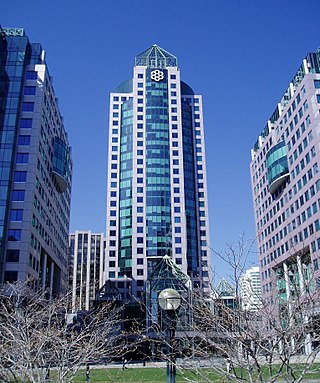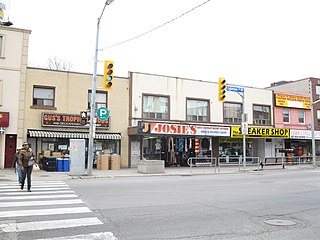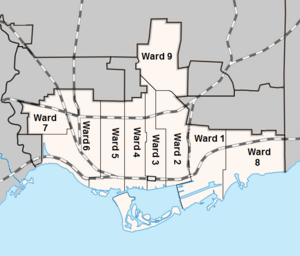
The Municipality of Metropolitan Toronto was an upper-tier level of municipal government in Ontario, Canada, from 1953 to 1998. It was made up of the old city of Toronto and numerous townships, towns and villages that surrounded Toronto, which were starting to urbanize rapidly after World War II. It was commonly referred to as "Metro Toronto" or "Metro".

York is a district and former city within Toronto, Ontario, Canada. It is located northwest of Old Toronto, southwest of North York and east of Etobicoke, where it is bounded by the Humber River.

The Chairman of the Municipality of Metropolitan Toronto or Metro Chairman was the regional chair of Metropolitan Toronto, Ontario, Canada, and the most senior political figure in the municipality. The Metro Chairman was elected by the members of Metropolitan Toronto Council.
Municipal elections were held in Toronto, Ontario, Canada, on December 5, 1966. The elections were the first in Toronto after its merger with several smaller suburban communities on January 1, 1967. Forest Hill and Swansea were annexed by the City of Toronto, Leaside was merged with the Township of East York to become the Borough of East York. Weston was combined with the Township of York to form the Borough of York. The Village of Long Branch and the towns of Mimico and New Toronto were merged with the Township of Etobicoke to form the Borough of Etobicoke.
Municipal elections were held in Toronto, Ontario, Canada, on December 7, 1964. Incumbent mayor Philip Givens defeated former mayor Allan Lamport.
Municipal elections were held in Toronto, Ontario, Canada, on December 3, 1962. Incumbent mayor Nathan Phillips, then the longest-serving mayor in Toronto history, lost to Controller Donald Summerville by a significant margin.
The Board of Control of Toronto, Ontario, Canada, was a part of its municipal government until it was abolished in 1969. It served as the executive committee of the Toronto City Council. When it was initially created in 1896 by mandate of the provincial government, it consisted of three Controllers appointed from and by the aldermen, and presided over by the Mayor of Toronto. Beginning in 1904, the Board of Control was directly elected by the city's electorate and consisted of four Controllers, presided over by the Mayor. Each voter could vote for up to four candidates, and the four with the most votes were elected. By tradition the controller who received the most votes would get the powerful budget chief position.
Municipal elections were held in Toronto, Ontario, Canada, on December 5, 1960. Six-year incumbent mayor Nathan Phillips was challenged by former mayor Allan Lamport and Controller Jean Newman. Phillips was returned to office.
Municipal elections were held in Toronto, Ontario, Canada, on December 1, 1958. Four year incumbent mayor Nathan Phillips won reelection against Controller Ford Brand, who was supported by the Co-operative Commonwealth Federation and Toronto Labour Council, and Controller Joseph Cornish.
Municipal elections were held in Toronto, Ontario, Canada, on December 3, 1956. Incumbent mayor Nathan Phillips was easily reelected. Jean Newman became the first woman elected to the Board of Control, and topped the poll to become budget chief.
Municipal elections were held in Toronto, Ontario, Canada, on December 5, 1955. Incumbent mayor Nathan Phillips, elected a year earlier, was easily reelected, defeating Controller Roy E. Belyea and Trotskyist Ross Dowson.
Municipal elections were held in Toronto, Ontario, Canada, on December 6, 1954. Incumbent mayor Leslie Saunders was defeated by Nathan Phillips in a close contest.
Municipal elections were held in Toronto, Ontario, Canada, on December 1, 1952. Incumbent mayor Allan Lamport easily won against former alderman Nathan Phillips.
Municipal elections were held in Toronto, Ontario, Canada, on December 3, 1951. Allan Lamport defeated incumbent Hiram E. McCallum in the mayoral election.
Municipal elections were held in Toronto, Ontario, Canada, on December 4, 1950. It was the second time the elections were held in December ; traditionally elections occurred on New Year's Day. Incumbent mayor Hiram E. McCallum narrowly defeated Allan Lamport. The defeat of Norman Freed and the failure of Charles Sims to regain his seat would bring to a close the communist Labor-Progressive Party's presence on Toronto's City Council though the party, and its successor, the Communist Party of Canada would continue to elect members as school trustees for several decades.
Municipal elections were held in Toronto, Ontario, Canada, on January 2, 1950. This was the last time election were held in January, as a ballot measure passed changing the election date to the first Monday in December. This attempt to increase turnout went into effect immediately and an election was held December 4, 1950. The central issue of the campaign was whether to legalize sport on Sundays, with Controller Allan Lamport the main proponent. A referendum was held on the subject, and it passed by a slim margin.
Municipal elections were held in Toronto, Ontario, Canada, on January 1, 1948. Robert Hood Saunders was re-elected as mayor in an election that also saw no changes on the Board of Control or City Council.
Frederick Joseph McMahon was a provincial court judge in Ontario who had previously been a lawyer and reeve of North York, Ontario from 1953 to 1955. As a lawyer, McMahon was well known for having defended bank robbers Edwin Alonzo Boyd and his brother Norman in their 1952 trials.
Ross Lipsett was a municipal politician in Toronto in the 1950s.




